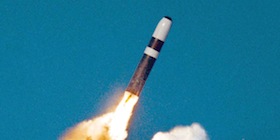Cut the Deficit By Spending Less on Nuclear Weapons
July 13, 2011
Featured Image
Today's top nuclear policy stories, with excerpts in bullet form.
Stories we're following today: Wednesday, July 13, 2011.
How to Shave a Bundle Off the Deficit: Spend Less on Nukes - Joe Cirincione in The Atlantic [link]
- The government is set to spend almost $700 billion on nuclear weapons over the next 10 years, roughly as much as it spent on the war in Iraq over the decade. Most of the money will be spent without any clear guidance on how many weapons we need and for what purpose.
- Right now, the United States spends about $54 billion each year on nuclear weapons and weapons-related programs … Some of these programs are essential. Many are not.
- Spending on weapons designed to fight last century's conflict drains funds from weapons needed for today's challenges … This is where Congress comes in. Members should not approve any of these new programs without a nuclear roadmap.
- Congress needs updated studies on potential savings and all projected costs. Only then can it rationally choose whether to save funds by reducing arsenals or increase funds to maintain the current force indefinitely.
A Review of the SASC FY 2012 Defense Bill - Kingston Reif and Laicie Olson at The Center for Arms Control and Non-Proliferation [link]
- On June 16 the Senate Armed Services Committee unanimously approved the FY 2012 National Defense Authorization Act (S. 1253). The committee approved $682.5 billion, including $553 billion for the Pentagon base budget, $117.8 billion for the wars in Iraq and Afghanistan and $18.1 billion for Department of Energy nuclear programs.
- The House version of the defense bill (H.R. 1540) includes many objectionable limitations on nuclear and missile defense policy matters...
- The Senate bill contains a number of reporting requirements on nuclear policy issues, but it does not impose policy or funding limitations. The Committee significantly watered down the bad House provisions without compromising Congress’ important oversight responsibilities over U.S. nuclear policy.
- [Read more for] a review and analysis of the key provisions in the bill.
Iran Prepares for Nuclear Work in Bunker: Sources - Fredrik Dahl in Reuters [link]
- Preparatory work is under way at the Fordow facility, tucked deep inside a mountain to protect it against any attacks, and machines used to refine uranium could soon be moved to the site near the clerical city of Qom, the sources said.
- The Islamic Republic said in June it would shift production of uranium enriched to 20 percent purity to Fordow from its main Natanz plant this year and triple output capacity.
- ... the IAEA added that as of May 21 no centrifuges had been introduced into the facility.
Iranian Missile Messages: Reading Between the Lines of "Great Prophet 6" - Greg Thielmann at the Arms Control Association [link]
- In a ten-day extravaganza of martial events, dubbed “Great Prophet 6,” Iran conducted a prodigious number of missile launches, showcasing a variety of ballistic and cruise missiles, including some new missile types and a newly displayed silo basing mode.
- Missiles are the premier weapon of the Islamic Republic of Iran … By acquiring nuclear warheads for its medium-range ballistic missiles, Iran could gain the ability to destroy specific targets.
- Based on the statements of Iranian military leaders and reports in Iran’s media, the main messages of “Great Prophet 6” for friends and foe were: that Iran’s strength is increasing in spite of the UN sanctions; that Iran is not dependent on other nations for its defense; that Iranian missiles could not be effectively preempted or intercepted; and that any attack on Iran would be met with devastating retaliation.
- There are, however, other conclusions to be drawn from Iran’s flexing of missile muscles. For those seeking to prevent or dissuade Tehran from developing nuclear weapons, the most important question is how much progress the exercises demonstrate toward Iran developing and deploying the missiles, which would carry nuclear warheads.
US-Iran: Tensions Mount Over Iraq, Nuke Sanctions - Barbara Slavin in The New Atlanticist [link]
- In recent weeks, a chorus of U.S. officials has accused Iran of providing lethal weapons to Iraqi Shiite militias that have targeted U.S. soldiers and caused a spike in U.S. death tolls.
- The fallout of the nuclear dispute is landing in Iraq, compounding political problems for Prime Minister Nouri al-Maliki who has struggled to form a stable coalition government more than a year after parliamentary elections.
- "It's not about Iraq at all, it's about U.S.-Iran relations," Vali Nasr, professor of international politics at the Fletcher School of Law and Diplomacy and a former State Department adviser, told IPS. "There is no doubt that the Iranians are escalating" to retaliate for U.S. sanctions over Iran's nuclear programme, Nasr said.



